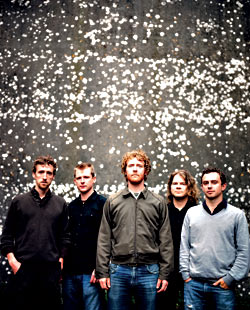Despite superstar status in their native home of Dublin, Ireland, and a 17-years-deep catalog, the Frames have remained mysteriously underappreciated on these shores. Some of that is beginning to change, thanks in part to the near-perfect execution of their latest record, The Cost, but also because of frontman Glen Hansard’s starring role in the art-house hit Once. The sweetly succinct, postmodern musical traces the growth of a relationship between a lovelorn street musician scraping out a living as a busker in Dublin (Hansard) and a shy Czech immigrant and preciously skilled pianist (played by Markéta Irglová). Aside from being an effortlessly charming little film, Once is an ideal showcase for Hansard’s broadly sympathetic voice, an evocative alto that evokes Cat Stevens’ best moments, but with a soaring range reminiscent of Bends-era Thom Yorke. Though it’s evident from chatting with Hansard that a career in film isn’t (and never was) on his agenda, there’s no denying that the guy is a natural-born performer.
Seattle Weekly: Do you have a preference for performing live versus working in the studio?
Glen Hansard: Oh, without a doubt live; for me it’s why you make music in the first place—to connect with an audience.The Frames are at their most potent live and working with the audience.Whether it’s walking into a room where they’re on our side going in, or whether we have 45 minutes to win them over—that’s the challenge.It’s the Communion part of the Mass. Making records is a split proposition. Half the time it’s fine, but the other half it’s horrible.However, that said, I feel like with our recent record, we finally achieved the closest we have come yet to capturing our live show on record.
When and how did the interest in acting develop?
The interest isn’t really there, or else I’d be an actor, not a musician.I love films, but I’ve never been looking to be an actor. Both opportunities came about innocently enough. The Commitments was an open casting call for street musicians in Dublin, and I tried out, as did every other musician in Dublin. For Once, it was sort of thrust upon me.
Did your role in Once feel like a re-creation of your own experiences or a true immersion in a foreign character?
Initially it felt like a re-creation, but at some point I got lost into the project, and it didn’t feel like me at all.But that was my fear…that folks would see it as a vanity project for me and my music.In the end, what I’m most grateful for is that the characters weren’t given names.
Are you content with your status in the U.S., or do you hope to reach the level of acclaim you’ve enjoyed in Ireland? Do you have any theories about why you haven’t had more success stateside yet?
I could place fault in any number of areas, but it’d only be a waste of energy.I’m happy with where things have been, and where they’ve grown to since we’ve taken control of our destiny.We’ve set up our own label in Ireland and started paying for everything ourselves; thus we only have to answer to ourselves.To me, Wilco have the best business model going for the modern band. They make the records they want, deliver them, tour, and always come out on top. They seem to know there is always tomorrow and that today isn’t the end of anything, regardless if there is a radio hit or 100,000 sales versus 300,0000.Of course, the goal is for as many people as possible to hear our music and to evolve artistically, and so there are still plenty of people who need to own a Frames record or two.
Can you see yourselves working as a band in another 10 years?
Without a doubt. This band will be 20 in a few years, and there’s no reason it can’t get to 28 or 30. We’ll be ready for marriage by then.








